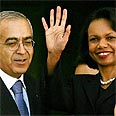
A new Road Map
Gaza reality presents golden opportunity to turn new leaf in West Bank
Now it is absolutely clear: There are two Palestinian entities. One in Gaza, led by Mahmoud al-Zahar and Ahmed Jabari, which is tough and refuses to recognize Israel and strives to continue fighting it until its final demise. And the second entity, located in the West Bank and led by Mahmoud Abbas and Salam Fayyad, which is seeking ways for a peaceful solution.
This is a rare opportunity for Israel to present the world with its willingness to engage in dialogue and to reach a compromise with the forces seeking coexistence.
Had we been scientists planning a lab experiment we couldn't have planned a better experiment: These are two distinct groups, geographically separated with practically no contact between them. Each is ruled by a relatively homogenic group, and the two groups refuse to speak with one another. Moreover, one group is backed by the more militant forces in the area, including Iran and Syria, whereas the second is backed by the more moderate and level-headed regimes.
This is a golden opportunity for the Israeli government to demonstrate its good will and to show the Palestinian people and the Arab world in general the vast advantages of living in peace as opposed to living in a constant state of war.
This can be achieved by a revised Road Map. The first phase would be the responsibility of the Palestinians. Following their humiliating failure in Gaza, President Abbas and his Prime Minister Fayyad must prove that just as the Strip has fallen under complete Hamas control, the West Bank should be under Fatah's complete rule headed by the president. They would have to boldly and determinedly use all their forces in a bid to bring the West Bank under their authority.
It should be hoped that in face of the images coming out of Gaza, leaders of militant gangs who define themselves as Fatah fighters would see the need to join forces and accept the president's authority.
Three crucial steps
On condition that the Palestinians fulfill their part, Israel would have to prove its commitment to peace by taking three crucial steps: Transfer of all funds belonging to the Palestinian Authority to the hands of Salam Fayyad, removal of the majority of checkpoints within the West Bank, and the release of several hundred prisoners. At this stage there is no point in removing illegal outposts that would quickly be retaken or would require substantial forces to guard.
After these measures have been taken, the sides would have to sit around the discussion table and reach an agreement with the Fatah leadership in the West Bank. This is still not about a comprehensive agreement, but rather, an agreement that would allow the Palestinians to conduct their lives without Israeli interference, and which would also include evacuation of several settlements.
In parallel, a clear equation must be created vis-à-vis the Hamas government in Gaza. Violence would be reciprocated with violence; calm would be reciprocated with calm. A desire to engage in dialogue would be reciprocated with dialogue and pragmatism on the Israeli side.
As long as Hamas refuses to talk to the opposite side and to recognize it, there would be no point in transferring funds or aid or even to open the crossings. Civilian aid should be transferred as necessary directly to the population, either by air drops or via international relief organizations. Electricity will only be supplied in exchange for regular and timely payment.
Israel should allow Egypt to manage the crossings on the southern borders. Egypt, which is threatened by extremist Islamic groups of its own, fears the Hamas rule no less than Israel, and it may be assumed that it would protect its borders more carefully.
Hopefully, both the Israeli and the Palestinian government in the West Bank wouldl read the map properly and reach the appropriate conclusions.
The writer is a lecturer at the Herzog Center for Diplomacy and Middle East Studies, at the Ben Gurion University of the Negev










